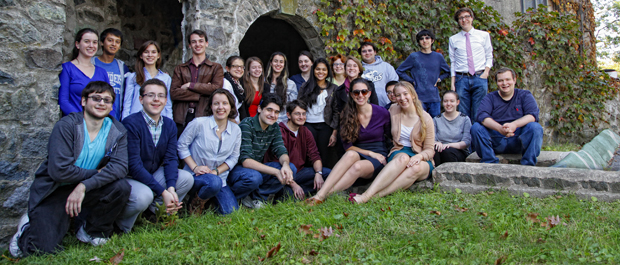Philosophy of inclusion helps debate club carry the day
Ranked No. 1, club now coaching next generation
 Photo/Mike Lovett
Photo/Mike LovettCurrent members of the Brandeis Academic Debate and Speech Society
The Brandeis Academic Debate and Speech Society (BADASS) is in peak form this season. Ranked as both the No. 1 club and team of the year in the American Parliamentary Debate Association, BADASS has left Ivy League teams like Harvard and Yale in the dust.
“Right now, things are looking pretty good,” says BADASS president David Altman ’15. “We’re looking to take this success and let it have some sort of multiplier effect.”
He hopes the club’s performance — beating out Ivy League debaters who generally snag the top slots — will encourage his classmates to get in on the action and become a member of BADASS, which requires neither tryouts nor advance training to join.
“You can come to a meeting this week, and we’ll put you on a bus to a tournament this weekend,” says member Flora Wang ’15.
Inclusiveness, both on campus and at tournaments, is the distinguishing feature of BADASS, members say, and has helped the club get into fighting trim. While many of the club’s most formidable opponents rely on debating experience and tryouts to build their teams, BADASS has turned that practice on its head.
“You never know who is going to be the next great debater,” Wang says. “Why would you ever want to cut them early on?”
Even in past seasons, when the club has climbed as high as No. 2 nationally, it’s always been the highest-ranked team that doesn’t hold tryouts. New members run the gamut from veteran high-school debaters to complete novices. At Tuesday and Thursday evening meetings, seasoned debaters teach newbies the basic rules, explain practice rounds and address particular topics.
In parliamentary debate, a round pits two teams of two debaters each against each other. Each team presents its argument in three alternating four- to eight-minute speeches. At the end, a judge decides which team has proved or disproved a case more convincingly.
Perhaps even more than recruiting new members and winning rounds, Altman says the club wants to be a service to the campus and the community. That’s why BADASS is gearing up to bring a new crop of potential debaters to campus: current high-school students.
In collaboration with the Brandeis Osher Lifelong Learning Institute (BOLLI) and the Boston Debate League, BADASS will help form and coach debate teams at Cambridge and Somerville public high schools. On Nov. 9, Brandeis will host a tournament for the league. BOLLI students and other volunteers will judge the debates.
“It’s about dignity and respect, being able to stand up on your own two feet and think,” says BOLLI director Avi Bernstein. “It’s about being invited into an adult world that takes you seriously.”
Bernstein, a former high-school debater himself, says the endeavor is a great opportunity to encourage intergenerational learning, as well as to help address educational inequities that exist between schools just miles apart.
“I went to high school in a very wealthy, privileged town, and I think all students should have that same level of access to opportunities,” Wang says. “Students will also get to see what it’s like to be at college.”
In the meantime, BADASS fans can follow along as the club takes its winning streak on the road. The American Parliamentary Debate meeting will take place at Harvard this weekend, and at the University of Pittsburgh next weekend.
For more information about joining BADASS, contact David Altman. To find out more about onsite training to become a volunteer tournament judge, contact Ilana Levine.
Categories: General, Student Life





